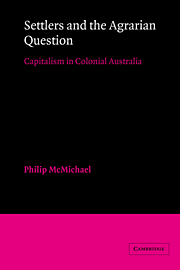Book contents
1 - The social structure of British hegemony
Published online by Cambridge University Press: 18 December 2009
Summary
INTRODUCTION
This study explores the social forces involved in the making of whitesettler Australian society in the nineteenth century. These forces had an international dimension not only because of Australia's colonial relationship with Britain, but also because Australian economy and society were the product of a particular phase of worldcapitalist development. Specifically, metropolitan industrial capitalism and its growing world market framed British expansion and socioeconomic possibilities in the colonies. Australian political and economic development, then, stemmed from these larger forces. Australian colonial history cannot be considered a discrete entity or as a study in British imperial relations. It needs a further dimension to locate it in a world-historical context — one that conceptualizes white settlement as an ingredient of the emerging world capitalist order.
The argument of this chapter is that the changing fortunes of British hegemony governed nineteenth-century world-capitalist development. Britain sought to maintain productive superiority in the world market through industrial specialization in an international division of labor. Paradoxically, this worldwide mercantilist frame-work required the imposition of a free trade regime in the world economy, and this encouraged, rather than suppressed, industrialization in metropolitan states. Not only did they have access to growing peripheral markets, but also free trade made available the productive and military possibilities inherent in British capital-goods exports in midcentury. Such technology laid the material foundations for a mercantilist challenge, as rival states organized national economies around this new intensive phase of industrial capital accumulation. This shift expressed the contradictory unity forged by a single hegemonic state within a world market subdivided politically by states.
- Type
- Chapter
- Information
- Settlers and the Agrarian QuestionCapitalism in Colonial Australia, pp. 1 - 32Publisher: Cambridge University PressPrint publication year: 1984



